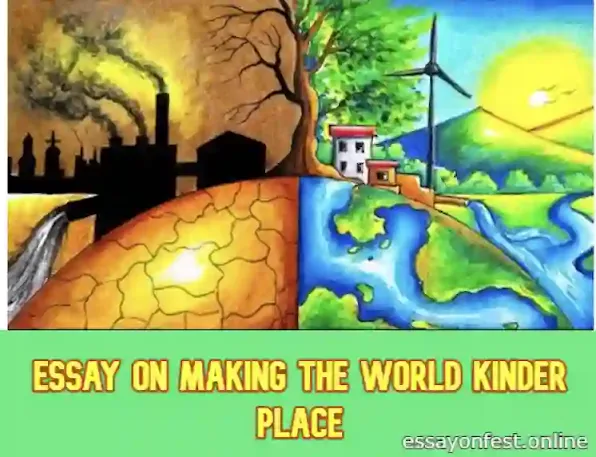Essay On Making The World Kinder Place
In a world often marked by division, conflict, and inequality, the aspiration to make it a kinder place resonates as a universal imperative. Kindness, the simple act of extending compassion, empathy, and generosity to others, holds the transformative power to heal wounds, bridge divides, and sow the seeds of a more harmonious society.
In this essay, we explore the significance of kindness and how individuals, communities, and societies can contribute to making the world a kinder place.
At its core, kindness embodies the essence of humanity. It transcends cultural, religious, and geographical boundaries, uniting people in a shared commitment to compassion and goodwill.
Kindness manifests in myriad forms – a comforting smile, a lending hand, a thoughtful gesture – each imbued with the capacity to uplift spirits and restore faith in the inherent goodness of humanity.
One of the fundamental pillars of fostering kindness is empathy – the ability to understand and share the feelings of others.
By cultivating empathy, individuals develop a deeper appreciation for the struggles, aspirations, and humanity of those around them. Empathy serves as the cornerstone of meaningful connections, fostering a sense of solidarity and mutual respect across diverse communities.
Education plays a pivotal role in nurturing kindness from an early age. Schools and educational institutions can integrate values of empathy, compassion, and inclusivity into their curricula, equipping students with the skills and mindset necessary to navigate an increasingly interconnected world with empathy and understanding.
By promoting kindness as a core value, educators empower future generations to become compassionate leaders and agents of positive change.
In addition to education, fostering a culture of kindness requires active engagement and participation from individuals, communities, and institutions. Random acts of kindness, whether big or small, have the power to ripple outward, inspiring others to pay it forward and create a cascading effect of compassion and generosity.
From volunteering at local shelters to organizing community clean-up drives, individuals can make meaningful contributions to the well-being of their communities and society at large.
Technology, despite its potential to isolate and divide, also offers innovative avenues for spreading kindness and fostering connection. Social media platforms, when used mindfully, can serve as powerful tools for amplifying voices of compassion, raising awareness about social issues, and mobilizing collective action.
Through online campaigns, virtual fundraisers, and digital advocacy efforts, individuals can harness the power of technology to spark positive change and build a more inclusive and empathetic world.
In building a kinder world, it is essential to address systemic injustices and disparities that perpetuate cycles of inequality and marginalization. Advocating for social justice, equity, and human rights represents a critical dimension of kindness in action.
By standing in solidarity with marginalized communities, challenging oppressive systems, and amplifying marginalized voices, individuals can contribute to creating a more just and equitable society where everyone has the opportunity to thrive.
Kindness extends beyond human relationships to encompass our relationship with the planet and all living beings. Environmental stewardship, sustainable living practices, and conservation efforts reflect a deep reverence for the interconnectedness of all life forms and a commitment to preserving the natural world for future generations.
By adopting eco-friendly habits, reducing waste, and advocating for environmental policies, individuals can demonstrate kindness towards the planet and promote ecological sustainability.
In conclusion, making the world a kinder place requires collective action, empathy, and a steadfast commitment to the values of compassion, empathy, and justice. As individuals, communities, and societies, we have the power to shape a future characterized by kindness, inclusion, and mutual respect.
By embracing the transformative potential of kindness in our daily lives and interactions, we can sow the seeds of a more compassionate and equitable world for generations to come. Together, let us strive to make kindness not only a virtue but a guiding principle that illuminates the path towards a brighter, more humane future.
Also read: Life And Teachings Of Chhatrapati Shivaji Maharaj Essay
Also read: 21ನೇ ಶತಮಾನದ ಆತಂಕಗಳು ಮತ್ತು ಗಾಂಧೀಜಿಯವರ
Also read: Electrical Safety Essay Writing In Kannada
Also read: Short Essay On Environment Pollution In Kannada
Also read: Kuvempu Speech In Kannada
THANK YOU SO MUCH




Many times I see essays that can demonstrate your different way of thinking. Make the most of your skills. Fascinating with new knowledge to discover. This experience was truly amazing.
ReplyDelete